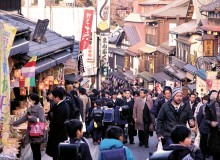
Originally published on metropolis.co.jp on April 2014

“Trust me.”
It’s perhaps the least-trustworthy sentence in existence—even children know to put their guards up when they hear it. There’s something diabolical in it that we connect with Hollywood villains and used car salesmen. Directly asking people to trust you is a sure way to tip off that they probably have no reason to, probably shouldn’t.
Yet that’s precisely the underlying message of Prime Minister Shinzo Abe’s dangerous “State Secrets Protection” legislation, which will go into effect later in 2014. The law gives the government authority to designate information as off-limits for the public, but was written with vague, sweeping language that leaves the door open for serious and frightening abuses of power. In addition, the law takes away the public’s access to vital information, strips the media of its speech and journalistic rights and violated the Diet’s own conventions for discussing and voting on legislation. Information deemed “secret” can be locked away from view for up to 60 years, and even beyond in certain circumstances. It gives a lot of unquestioned power to the big man at the top, telling us to trust him.
And that’s just the beginning.
Here’s how it works: under the State Secrets Protection law, the government can prosecute anyone involved with the release of information it deems to be vital to the national interest. That includes government officials who leak information, media publishers who report on it, and even journalists who look into the “wrong” story. While many government affairs certainly require a high level of privacy, the central problem is that there were no limits written into the law regarding how this power can be used, and no vetting process to oversee whether it is being used appropriately.
An additional problem is the punishment connected with breaking this law. If it were a matter of basic censorship, “inappropriate” articles would simply never be allowed to see the light of day. However, for breaking the State Secrets Protection law, violators can actually be imprisoned for up to ten years. Do journalists know exactly where the boundaries are? Far from it.

According to Dr. Koichi Nakano (pictured), a professor of Japanese politics and political theory at Sophia University, there will be no announcement of prohibited subjects: the government will be “keeping secret about the secrets,” a situation he calls “surreal.” That will leave journalists playing a very high-stakes guessing game, which can only lead to immense self-censorship on their part in order to stay far away from any possible trouble and to being extremely careful with their words when reporting on major issues, such as nuclear power. That, in turn, will castrate journalistic content far more than censorship ever would, leaving the public woefully uninformed about what’s happening in their own country.
An understandable reaction to this kind of law is to wonder what exactly the government wants to hide. Is there a looming threat in Fukushima, Pyongyang or Beijing that needs to be covered up? Unlikely, says Professor Jeff Kingston, director of Asian studies at Temple University Japan. Professor Kingston notes that the roots of this law can be traced back to the ’80s, when a similar law was proposed on a national level, but rejected. This attempt came on the heels of the Lockheed Scandal of 1976, when then-Prime Minister Kakuei Tanaka was arrested for accepting ¥500 million in a bribery scandal. The people pushed for greater access to the government’s doings. Local governments took it upon themselves to remedy that. “From the early 1980s, town after town and prefecture after prefecture adopted information disclosure laws so that by 1997, every major municipality and every prefecture had embraced this grassroots demand for transparency,” Professor Kingston explains.
Why, then, would the national government want to pass a law to counteract that? While greater transparency is certainly desirable for the people, it can be disastrous for the politicians who could have their shortcomings exposed. “This greater transparency led to numerous scandals coming to light,” says Professor Kingston, “ranging from petty embezzlement to vast squandering of funds, and also actions by officials that harmed the public interest.” That battle rages on today, with this current version of the law continuing the national government’s fight to “enable bureaucrats to hide inconvenient or incriminating documents from public scrutiny.”
The proposed law in the ’80s failed to pass and was tagged as being “anti-democratic.” Although the 2013 version of the bill succeeded, its anti-democratic nature remains an enormous concern. For those of you who weren’t paying attention in high school, democratic countries work like this: the elected government runs the country. The media watches the government and reports on its actions to the people, who use that information to decide whether to replace or renew the government officials in the next election. With the passage of the State Secrets Protection law, the only information the people will get is the information that passes inspection by those same politicians, who are unlikely to give unflattering or even two-sided updates of their activities. Except for a brief 11-month period in the early 1990s, and a more recent blip from 2009 to 2012, Prime Minister Abe’s Liberal Democratic Party (LDP) has been in power since 1955. This law will certainly help keep it that way.







